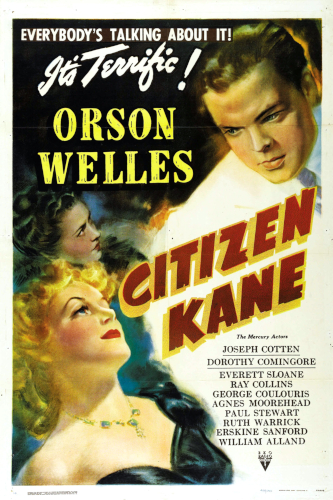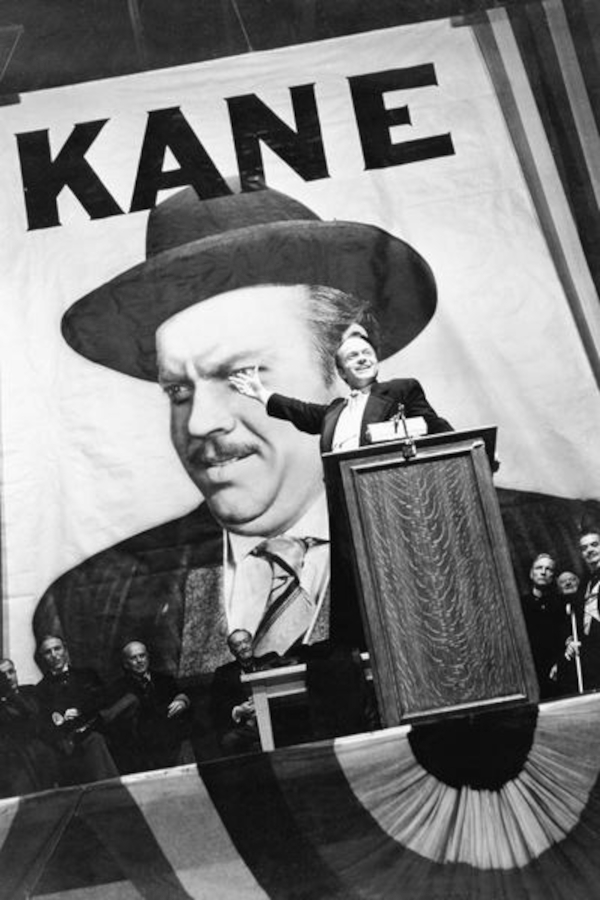Citizen Kane takes it up the Rosebud
I’d started midyear and knew after that first spring that CSUCI kinda sucked, so I enrolled for a few summer courses to move things along. This was killing my summer so I leaned heavily into what I already knew. There was a Nonprofit Management class that was almost word-for-word lifted from the business classes I’d taken at PCC, and there was this- Pols335, Politics and Film. This was more of a challenge than I expected, but just in volume. Each week had two films, each film had 5-10 pages’ worth of questions, and each week had an essay on the themes of that week’s films.
The funny thing is, without my own film background the class would have been much easier. I would have been dumber going in and would have barely had half as much to say. Some of these were films I’d seen before, some were completely new. It’s funny to me that there are legit classics – Kane, All the President’s Men, Network – that I’d never seen before even with my movie snobbery. It took a college class taken 20 years “late” to check off titles made 20 years before “on time”.
Citizen Kane
- Discuss the various cinematic techniques used in Citizen Kane including: lighting, camera angles, depth of focus, music, sound, and special effects. How do they contribute to setting the mood of the film and to telling the story?
This is a massive question, but to pick an element, the treatment of Charles Kane onscreen employs several techniques that serve to make the character stand out from the film he’s printed on. Through the use of wide or close shots, Kane goes from being a whole young man dancing across the screen to a fraction of a man grasping at a memory. Sequences where Kane is being particularly compassionate or rational are shot with an even lighting that picks up all the nuances of expression; elsewhere he is in sharp contrast through a tilted camera- a man in conflict, on uneven ground.
- How does telling the story from multiple perspectives (Thatcher, Leland, Bernstein, Alexander etc.) contribute to the film? How is time dealt with by Welles?
Dividing the story into character-based chapters accomplishes several things. As each of these people interacted with Kane for different purposes, the audience gets to see different facets of Kane’s character and how it developed over the course of that relationship. It’s clear that a puzzle is being assembled, and suspense is built as you narrow on the one missing piece that could be coming from anywhere in his life. Time is both continuous and random, and the repeated passes through the same years leave an impression of Kane as young and old at the same time.
- What view does Kane (and perhaps Welles?) have of the common people? How does that come across in Kane’s behavior and his decisions while running the newspaper?
Citizen Kane’s common man is powerful and deserving of respect but in need of a protective guiding hand. When he sees himself as that guiding hand he is vibrant and enthusiastic, moving into the editor’s office because news happens around the clock. After the common people turn away, the enthusiasm is gone and left is only the will to spread influence, to tell people what to think. His staff stroll into a shuttered office late at night to write a few paragraphs and leave. Content-wise, his Inquirer is reduced from political sensation into an approximation of a planted Amazon product review.

- How does Citizen Kane illustrate both the positive potential of a free press in a capitalist society as well the negative potential of unfettered journalism?
The Inquirer’s investigations into government corruption provided a public benefit that outweighed the ambitions of its owner. That the public was motivated to accept criminal corruption over moral corruption is perhaps a jab at the methods of a sensationalist press, but a more telling moment came after one of the operas. Each of these head writers going into the office for the express purpose of writing something they know to be false, just to make the boss happy.
- What change is depicted in the New York Inquirer after Kane takes over the newspaper? Is it a change for the better?
Kane immediately turns the declining single-edition Inquirer into a full-time splash of dynamism. Reporters are instructed explicitly to go out and stir up news, to provoke a response that could be printed. Obviously there are ethical compromises underway and ‘Jerry Springer’-style journalism can lead to people getting hurt. But in some ways this is not entirely a bad thing. The circulation of the Inquirer grew to outnumber the initial numbers for the Inquirer and Chronicle combined- that’s more people getting the news and being informed.
- At the end of the film, do you like Kane, hate him, feel sorry for him? Explain.
Charles Kane has an interesting sense of humor, and his principles don’t seem to be coming from a place of malice. That said, he is an intelligent man who makes conscious choices that place others at risk of harm because he can’t quite grasp what he’s looking for. With the resources available to him, this is a man who has the resources to have a better understanding of himself and the sense to figure out why that would be a good thing. He’s not a guy I would hang out with.
- React to Kane’s Declaration of Principles that he publishes in his first edition of the Inquirer. Does the newspaper live up to it? The Declaration reads: “I will provide the people of this city with a daily paper that will tell all the news honestly. I will also provide them with a fighting and tireless champion of their rights as citizens and as human beings.”
The ‘Declaration of Principles’ was certainly a stunt to draw reader interest, but the time and effort put by Kane into those relatively few words make them an aspirational statement as to his own character. As I watch the film and see Kane make destructive choices, I can keep in mind the kind of person that Kane genuinely wants to be. As an expression of his political will, the paper doesn’t live up those principles at all, any more than any person could live within a single mission statement.
- Citizen Kane roughly parallels the career of real life media magnate William Randolph Hearst (who built Hearst Castle in San Simeon). Does this fact make a difference to you when you think about the film?
It makes me curious as to the extent of the parallels. Kane’s early grandstanding is credited for pushing the country towards war, but his later self-serving headlines are more benign in nature. Were I to look, I’d start with the extent and effects of Hearst’s activism as an insight into Kane’s decision-making.
- What does Rosebud mean? How much does it matter in understanding the character of Charles Foster Kane as well as the film?
Rosebud was the sled owned by Charles as a child, but it wasn’t what was on his mind. In my first take on the story, the sled is emblematic of a simpler time when he was surrounded by the complex and sometimes painful (but still present) love of his parents. You see at the end that he was looking all along for some approximation of the validation he grew up without. Like Kane says himself, perhaps his mother should have chosen a less reliable banker to raise him.
- Why do you think Welles called the film Citizen Kane?
In a sense, I think there’s a level on which Charles Kane simply wanted to be like everyone else. The Freudian significance of the absence of parental affection might speak somehow to the growing level of control he seeks to exert on his wives, but his political campaign isn’t a quest for his mother’s love. It’s his not wanting to be the different one, his not wanting to be seen as deficient for what he grew up without. I read his campaign as his wanting to be one of millions despite his differences. Or maybe the election is an unrelated wanting to be the parent he never had. Maybe the title is a suggestion by Welles that this flawed disaster (Kane) is just the average confused American writ large.
- Why do you think that film critics consider Citizen Kane to be a great (some say the greatest) American film? Do you agree? Why or why not?
I would have to have a better understanding of the context of the filmmaking time, I think. There are many hallmarks of America’s personality in the film, the dynamism between people and money and politics, the defiance and ambition of Charles Kane, the idealization of the everyman and (in a more abstract way) the traditional family. Welles himself certainly commands the screen with an arrogant charm, and if this is America’s film, then his paternalism can be a canon validation of America’s intentions (which we promise, really are the best for everyone). But greatest? That gets into simple popularity territory.
